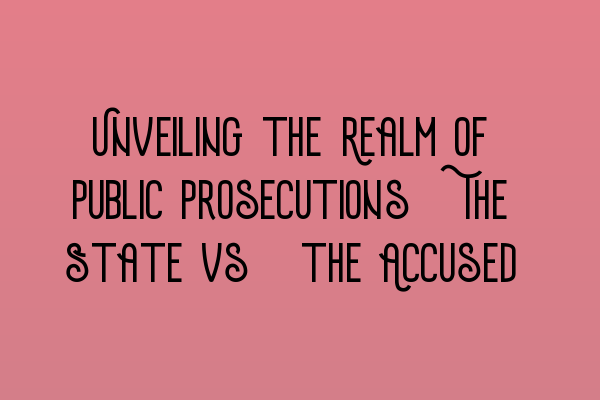Unveiling the Realm of Public Prosecutions: The State vs. the Accused
Have you ever wondered about the inner workings of the criminal justice system? When a criminal offense is committed, a series of legal procedures are set in motion to establish guilt, protect the rights of the accused, and serve justice to society. One of the key players in this process is the public prosecutor, whose role is to represent the state in bringing charges against the accused.
Understanding the dynamics of public prosecutions is essential for aspiring criminal law practitioners. Whether you’re preparing for the Solicitors Qualifying Examination (SQE) or simply curious about the legal landscape, this article will take you on a journey through the intricate world of public prosecutions.
The Role of the Public Prosecutor
The public prosecutor, also known as the Crown Prosecutor or Crown Counsel, acts as the representative of the state in criminal proceedings. Their primary duty is to ensure that justice is served by presenting a compelling case against the accused. This involves gathering evidence, interviewing witnesses, and making informed decisions about whether to proceed with charges.
The prosecutor’s role is multifaceted. They must navigate the complex web of criminal laws, adhere to ethical standards, and maintain fairness throughout the legal process. Furthermore, they have a responsibility to keep victims informed about the progress of their case and advocate for their rights.
It’s important to note that public prosecutors operate independently from law enforcement agencies. While they may collaborate with investigators, their primary focus is to act in the interests of justice rather than solely supporting the police’s version of events.
The Stages of a Public Prosecution
A public prosecution is not a singular event but a series of stages that unfold over time. Each stage is crucial in building a solid case and safeguarding the rights of all parties involved. Let’s delve into the different stages of a public prosecution:
Investigation and Charging
The first stage involves the gathering of evidence and building a case against the accused. Investigators work diligently to collect witness statements, physical evidence, and any other relevant information. Once the investigation is complete, the public prosecutor assesses the evidence and decides whether to proceed with formal charges. This decision depends on the strength of the evidence and whether it is in the public interest to prosecute.
To prepare for the SQE or enhance your understanding of this stage, check out the SQE 1 Practice Exam Questions.
Pre-trial and Plea Bargaining
After charges have been filed, the case moves to the pre-trial stage. Here, the public prosecutor and defense counsel engage in negotiations regarding a possible plea bargain. Plea bargaining, when appropriate, can expedite the legal process and result in a mutually beneficial outcome for both parties. This stage involves careful analysis of the evidence, strategic conversations, and a careful assessment of the potential risks and rewards of proceeding to trial.
If you want to delve deeper into the art of negotiation and prepare for the SQE, our Practice Mocks FLK1 FLK2 course is essential.
Trial and Presentation of Evidence
If a plea agreement cannot be reached, the case proceeds to trial. This stage is often the most well-known aspect of public prosecutions, featuring attorneys presenting evidence, questioning witnesses, and making arguments in court. The public prosecutor plays a crucial role in presenting a compelling case against the accused, carefully weaving together the facts and legal principles to persuade the judge or jury of guilt beyond a reasonable doubt.
Mastering the art of trial advocacy is a vital skill for budding criminal lawyers. Consider enrolling in SQE 2 Preparation Courses for comprehensive training in trial techniques.
Sentencing and Appeals
If the accused is found guilty, the court proceeds to the sentencing stage. The public prosecutor presents arguments in favor of an appropriate sentence based on the severity of the crime and any aggravating or mitigating factors. The judge ultimately determines the sentence, taking into account the prosecutor’s recommendations, statutory guidelines, and case-specific circumstances.
In some cases, the accused may choose to appeal the conviction. Public prosecutors may find themselves defending their case in higher courts, presenting arguments to uphold the validity of the original trial and conviction.
Conclusion
Public prosecutions form the backbone of the criminal justice system. The role of the public prosecutor is paramount in seeking justice, safeguarding the rights of the accused, and ensuring the integrity of the legal process. Aspiring criminal law practitioners must possess a thorough understanding of this realm to succeed in their careers.
To stay updated on the latest SRA SQE Exam Dates and receive comprehensive preparation materials, check out our SQE 1 Preparation Courses. Remember, knowledge, practice, and dedication are the keys to success in the legal profession.
